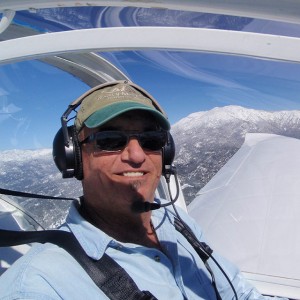
Jerry Swovelin
Plunging toward earth at 120 miles per hour after leaping from an airplane requires a bit of preparation. And as an advanced free-fall skydiving instructor, Jerry Swovelin knows all about preparation. When he’s not guiding thrill seekers toward a safe landing, he’s helping students prepare for the most important exams of their lives. As a test prep instructor at SDSU Global Campus, Swovelin teaches important strategies, expectations, and content specifics about the CBEST, CSET, GMAT, GRE, and LSAT exams.
For over 20 years, students have been maximizing their test-taking potential by taking these courses at SDSU Global Campus, which are held in partnership with BTPS Testing. BTPS is distinguished by its outstanding educators, which include not only Jerry, but his wife Barb Swovelin.
Tell me about your background and how you became a test preparation instructor.
I have a master’s degree in psychology, specifically a field called community-clinical psychology; my graduate program had a major emphasis on both testing and statistics, all of which applies directly to the test-preparation courses I teach. At that same time, I taught college-level psychology courses part-time through the Los Angeles Community College District. In addition, I also have several years of teaching experience when I ran a large skydiving school; that was one of the most rewarding periods of my teaching career. Finally, there is one specific reason I became a test-prep instructor, and her name is Barbara.
Which test prep courses do you teach at SDSU?
I regularly teach courses for the GMAT, the GRE, and the LSAT exams.
How many days does a typical course meet and how many hours per session?
Each course is conducted over four Saturday classes, and each class meets from 9 a.m. to 3 p.m.
Does the course require homework outside the classroom?
There’s no assigned homework, per se, but on non-class days we encourage students to practice their test-taking skills for about two hours daily. This additional practice helps maximize the value of the course for each student.
Can you summarize one or two “test-proven strategies” that you use in your instruction?
To prepare for the Reading Comprehension section, for example, I provide strategies that allow for effective reading of the prompt passage, along with specific techniques to master the most common question types, as well as tools that are used to quickly eliminate wrong answers. On the other hand, when I teach students how to tackle the oddball Analytical Reasoning questions, it’s more like analyzing and completing a variety of intricate puzzles.
What’s the general outlook of students who complete the course? Do they feel confident and ready to tackle the test?
Yes. My students gain confidence by knowing what to expect on the exam, by knowing how to approach the different sections, and by getting practice on the various question types, both in-class and at home.
Do students take advantage of the course’s great feature of a free repeat if needed?
Absolutely. We have repeat students in virtually every class. They return for a variety of reasons. Some never got around to taking the exam and now they want a refresher, some took their first try at the exam but didn’t achieve the score they wanted, so now they want to improve their skills even more. Some students plan from the beginning to take the class more than once to maximize their skills before tackling the actual exam.
Do you have any fun or interesting anecdotes to share from a test-prep class?
Should I tell the story of once being locked out of the building at San Francisco State? Since it was their very crowded commencement day, the campus police were much too busy to drop everything and come let me in. I spent the first couple of hours standing in the quad, with the students sitting on some nice sunny stairs, while I lectured on and on about esoteric test-taking strategies. We finally were admitted to the classroom and everyone laughed it off as a lark, to get to have class outdoors on a rare sunny day in San Francisco.
Who should take a test-prep course?
Anyone who wants help understanding how to intellectually approach the test, how to work through the questions and the reading passages. Anyone who wants to ensure that they can write a high-scoring timed essay, and/or how to understand the logical and critical reasoning sections. Many students take the course simply to learn specific test-taking strategies.
What is the best advice you can give students about test preparation?
Give yourself plenty of time; you’ll find it takes longer than you think until you finally feel properly prepared. Learn about your own personal strengths and weaknesses by taking practice tests and identifying patterns. When reviewing your practice exams, don’t forget to analyze the wrong answers to better understand how they try to fool us. When taking the actual exam, concentrate on applying the strategies you learned in class and the tricks you learned in practice.
What would students be surprised to learn about you?
I’ve been happily married to another test-prep instructor since 1984 (it makes for some ‘interesting’ dinner conversations). We’re both licensed pilots and own our own little plane. In addition, we’re both accomplished skydivers; I have over 7,000 jumps, Barb has over 2,000.